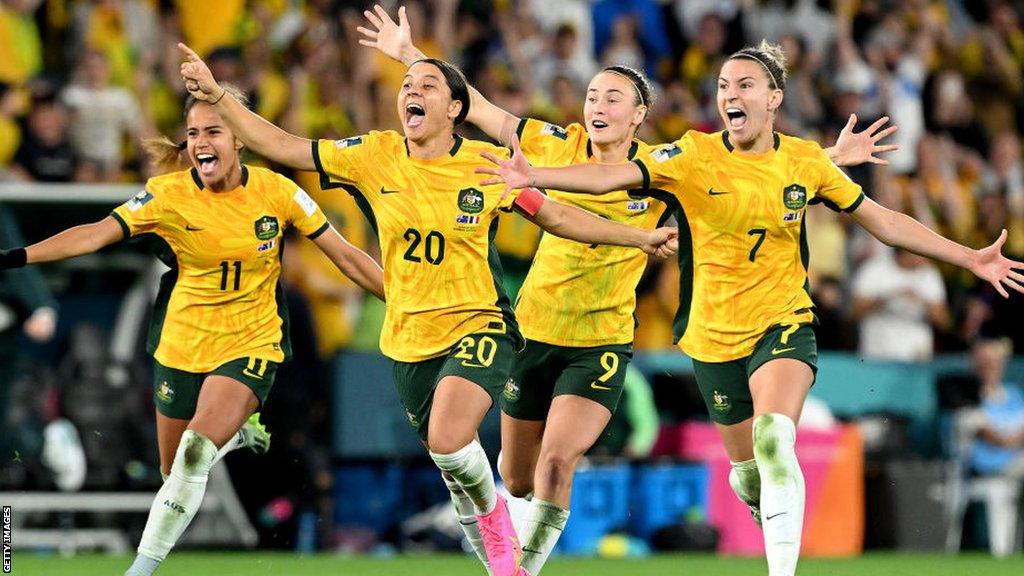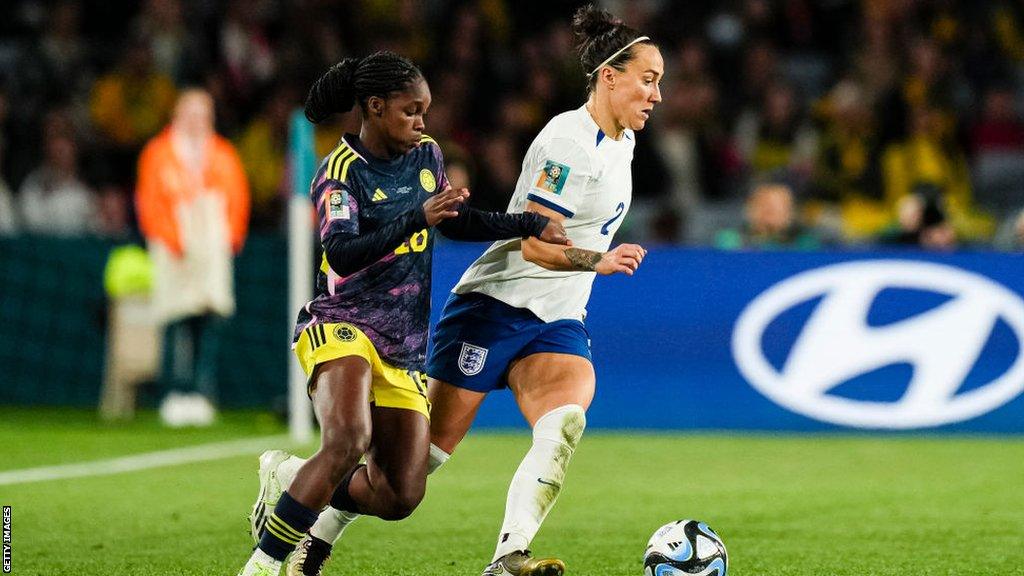Karen Bardsley: The key battles that could decide Australia v England
- Published
- comments

Cast your mind back to April's friendly between England and Australia.
The Lionesses lost for the first time under Sarina Wiegman, ending a 30-game unbeaten run, and it was at the hands of Sam Kerr and the Matildas.
I wouldn't be surprised if notes of that 2-0 loss are shared before Wednesday's Women's World Cup semi-final, which sees the two teams pitted against each other once again.
England played in a 4-3-3 formation and Euro 2022 captain Leah Williamson led from the back in that defeat. But midfielder Keira Walsh was essentially marked out of the game.
Things have changed since then.
The Lionesses are playing with a back three now, Williamson is sidelined with injury, the phenomenal Lauren James is serving a two-match ban, and Lauren Hemp and Alessia Russo have become a frightening attacking duo.
Things have changed for the Australians too.
Now the apple of the nation's eye, the Matildas have embraced the pressure of being co-hosts on the world's biggest footballing stage. Trust me, after watching Australia beat the Republic of Ireland and Denmark, the noise the fans generate is extremely loud.
So in feverish anticipation of Wednesday's semi-final, I thought I'd explore the key battles where the game could be won and lost...
Sam Kerr part of Australia 'danger' for England semi-final
Sam Kerr v Millie Bright

(From left to right) Mary Fowler, Sam Kerr, Caitlin Foord and Steph Catley all took penalties in the shootout victory over France
These two colossal footballing talents train against each other week in and week out for Chelsea. It's fair to say it will be a fascinating battle of give and take.
After a rusty start in the 1-0 win against Haiti, Millie Bright has hit phenomenal form. Shifting from a back four to a back three has certainly played to her strengths.
Bright's aerial dominance, decisive defending, brave blocking, and no-nonsense ability to start attacks makes her more than capable of combatting the threat of arguably the world's best striker, Sam Kerr.
Kerr will undoubtedly attempt to play a game of cat and mouse with England's back three. In the blink of an eye, she is capable of unbalancing defenders with her athleticism, finding space and causing chaos. And let's not overlook her instinctive ability to clinically finish off chances.
Without a doubt, Kerr will seamlessly bring young Australian starlet Mary Fowler into play.
An exceptionally skilful player with superb technical ability and balance, the 20-year-old Manchester City player loves to threaten centrally and is perfectly happy creating overloads in wide areas. The Lionesses' defence has performed admirably, but this will be their biggest test yet.
Sam Kerr: 'Laughed in face' of coach that said she 'would be the best player in the world'
The battle for midfield
Barcelona's Walsh pulls the strings in England's midfield. End of story.
Critical to England's build-up play in possession, and defensive organisation and stability out of possession, Walsh finds space and breaks lines better than almost any midfielder in the game.
Her intelligence and awareness allows her to manipulate opponents and dictate tempo, even when she doesn't have the ball.
Speaking of tempo, Georgia Stanway is an unyielding force in the midfield. Commonly described as a box to box midfielder, she reads the game well and can change the outcome in an instant.
The Bayern Munich player takes just as much pride in cracking challenges as she does in hitting belters from distance or delivering beautifully weighted, defence-splitting passes.
England's midfield duo have matured into their roles under Weigman and complement each other's natural tendencies well. But they'll have their work cut out for them against Australia.
The industrious Australian midfield pairing of Kyra Cooney-Cross and Katrina Gorry have developed a strong partnership that has improved over the course of the tournament.
Gorry, who plays for Swedish club Vittsjo GIK, is an experienced, competitive player who is not afraid to put herself about the pitch. The 30-year-old is happy to link up play but is prone to losing possession in key areas.
Hammarby midfielder Cooney-Cross, 21, an aggressive, tenacious player, covers large distances when she presses and is keen to get forward to start quick attacks for the likes of Kerr, Fowler and Emily van Egmond.
Both players pose threats and will certainly be disruptive to England's build-up play. But England have proven they're an adaptable team and Weigman will ensure the team are well prepared.
Lucy Bronze v Steph Catley

England's Lucy Bronze dealt well with Colombia teenager Linda Caicedo in the quarter-final victory
Off the back of Lucy Bronze's best performance in this tournament thus far in the 2-1 win over Colombia, she will have the unenviable task of managing Australia's formidable left side (although I know this is just the thing she lives for).
I imagine the Barcelona player will be battling with Arsenal's Steph Catley more often than not, however, the right-back's role demands that she helps Jess Carter manage Caitlin Foord.
Foord, another Arsenal player, is an exciting attacker who loves one-on-ones and lives for big moments, constantly overlapping Catley.
Catley, an athletic, disciplined, no-nonsense defender, efficiently goes about her business. She will mainly be responsible for keeping Bronze, 31, away from England's attack.
But Bronze thinks on her feet. Always on the lookout for ways to get one over on an opponent, she perpetually solves problems and creates opportunities for team-mates.
Both England and Australia are keen to support attacking play where possible so we might see both wide threats nullified. But for entertainment's sake, let's hope not too much.
I think this game will ultimately come down to who is most effective in transition, and each of those key battles will be imperative to controlling those transitions.
Former England goalkeeper Karen Bardsley was talking to BBC Sport's Emma Sanders.